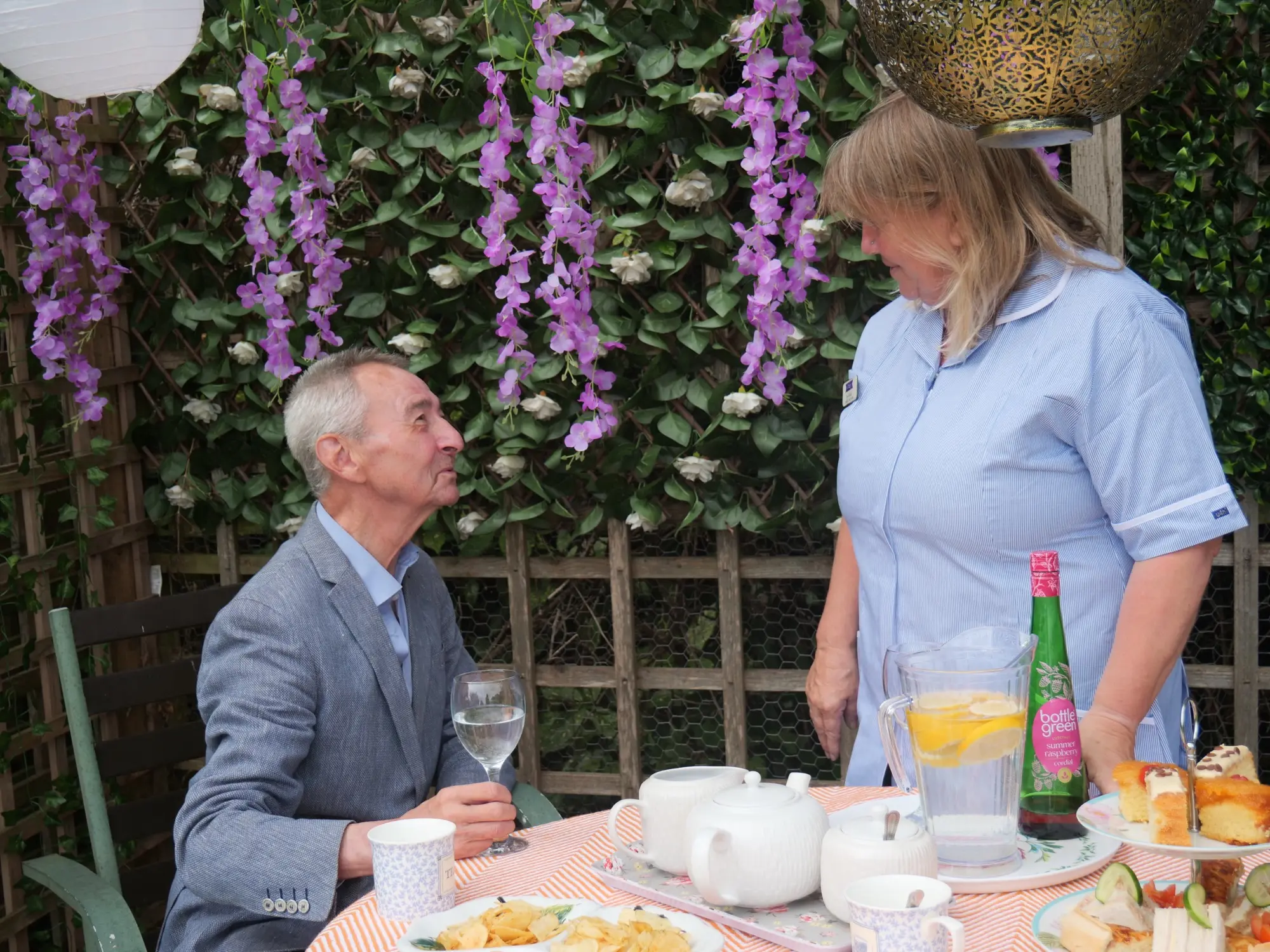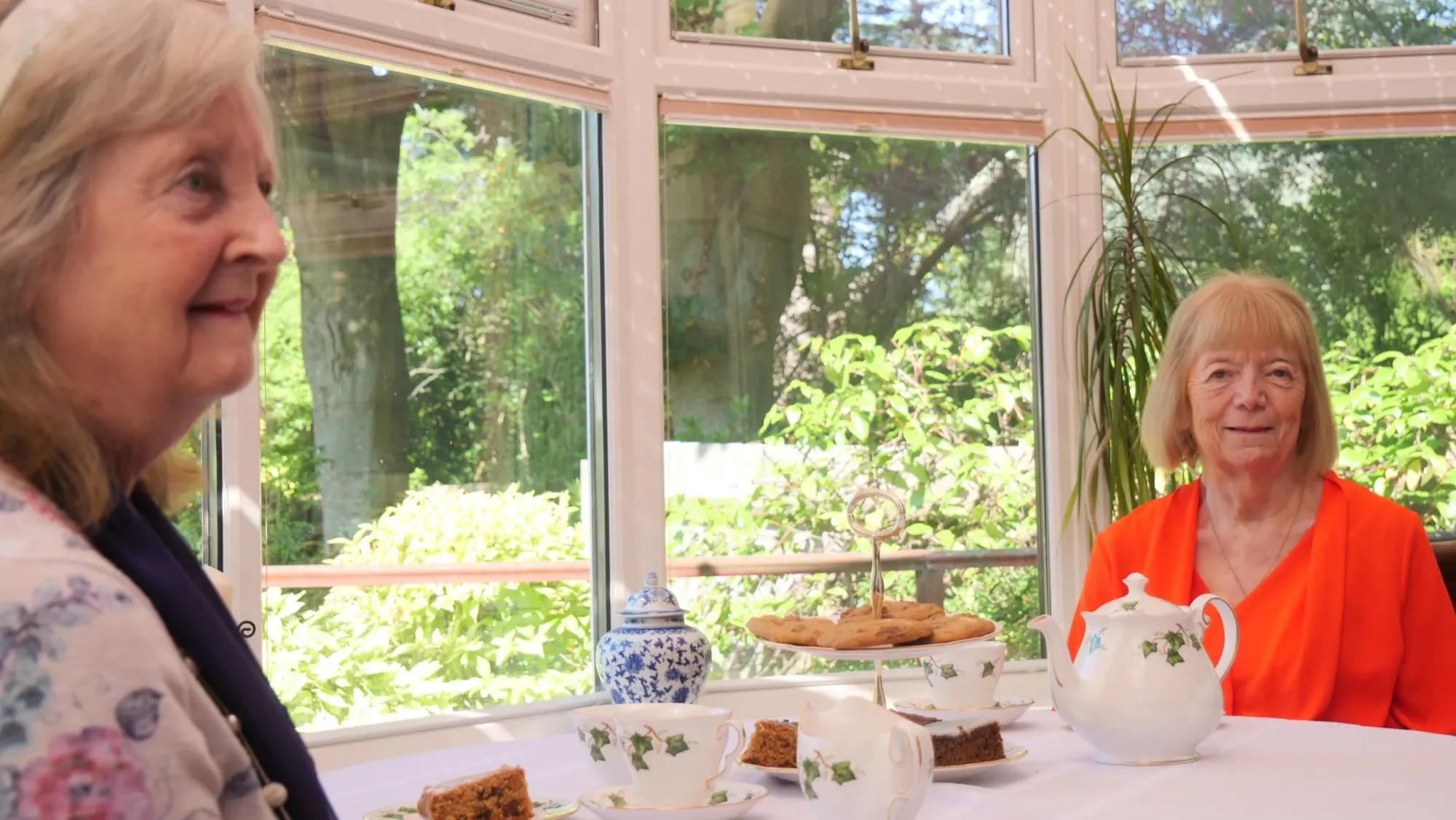Nutrition and hydration in care homes

Upon arrival at our home, one of our chefs will spend time getting to know you, your likes and dislikes, and understanding some of your favourite dishes. This helps them cater to your needs and work towards creating nutritionally balanced and delicious dishes for you.
Eating well isn’t always as easy as it sounds. Our experienced care team are always on hand to support and encourage you at mealtimes, especially when you may have lost interest in food and drink.
Through the support of our expert chefs, you can enjoy a nutritionally balanced diet that meets your needs. This may not be possible living at home. Whether it’s knowing what foods to eat, cooking, or living with a health condition preventing you from eating comfortably, our teams are there to help.

Catering to your preferences

Whether you like the structure of three balanced meals a day, or prefer to eat smaller portions at mealtimes and snacks in between, our care home chefs can provide nutritious meals to suit your preferences.
All of our care homes cater for a range of dietary needs, from coeliac and gluten-free, to vegetarian and vegan. Our chefs use local and seasonal ingredients as much as possible in designing their menus, and work hard to create appetising meals which are not only nutritionally-balanced, but delicious too!

Care home food for people
living with dementia
For those living with dementia who remain in their own home, it can be a struggle to eat and drink properly. Access to nutritious meals, cooking and knowing when they should eat can become challenging, resulting in weight loss and dehydration.
Our kitchen team are experts in catering for those living with dementia. They often prepare finger foods for our residents, making it much easier to eat, rather than struggling with a knife and fork. Whatsmore, our care team and chefs work together to ensure residents are encouraged to eat and drink by taking into account their motivations and taste preferences.
This can also play a big part in reminiscence. Being reminded of childhood favourites, by taste or smell, can help stimulate conversations with family members and our care team about treasured memories and stories.


Our dining experience
At all of our homes you will be served freshly prepared home cooked meals by our team of talented chefs. They ensure all our meals are healthy, nutritionally balanced and, most importantly, locally sourced wherever possible. Meals are served in our homely dining rooms, but you also have the option for food to be served in your room for a more private dining experience.

Keeping track of nutrition
With our portal, you and your loved ones can instantly check in on your care with real time updates at the click of a button. What care you have received, your medication and even how much you’ve had to eat and drink are all displayed on our handy app.
When you start your care with us, you will be given a login to our portal and a link to download our app.
Get a taste for what we offer
Our fantastic chefs work hard to ensure that you enjoy nutritious and delicous dishes that are to your liking. They create bespoke menu’s based on your preferences and put together your daily menu options to ensure you have choice and variety in what you eat.


As a trained pâtissier sweet treats are a must. Everything that leaves my kitchen is made with love! We cater for each individual dietary requirement and preferences, with a person centred approach. At Blenheim I personally speak to residents for feedback on their meals and mealtimes are very flexible. Our residents eat what they want and when they want, that’s what truly makes Blenheim a home from home.
Sharon – (Chef, Blenheim Care Home)


Frequently asked questions
Upon arrival at our home, one of our chefs will spend time getting to know you, your likes and dislikes and understanding some of your favourite dishes. This helps them cater to your needs and create nutritionally balanced and delicious dishes that you will enjoy.
Our team of fantastic chefs create texture modified diets for residents living with dysphagia. We ensure that, when we modify certain dishes, they contain all the nutrients you need.
At our homes we provide breakfast, lunch, supper, afternoon tea, drinks and snacks throughout the day. Nothing is too much trouble. We want you to continue living as you would at home and we are on hand to provide you with as much or as little support as you need.
All our care homes cater for a range of dietary needs, from coeliac and gluten-free, to vegetarian and vegan.
All of our care homes are regulated and have recieved a rating from the Food Standards Agency for hygeine standards obtained in the home.
We’re proud that the FSA have rated and regulated all of our care and nursing homes to provide you with the confidence that we produce and serve high-quality meals.
All reports can be found on the FSA website.
Relatives and friends can bring food gifts or food from home for their loved one. However, it is important to check with the care homes’ registered manager that the food meets their food safety and hygiene standards and that it doesn’t pose a risk to other residents who may have allergies or intolerances.
According to The Health and Social Care Act 2008, the “nutritional and hydration needs of service users must be met” for any overnight care home resident, unless it would not be in the person’s best interest. The Act defines meeting nutritional and hydration needs as the following:
– Providing residents with “suitable and nutritious food and hydration which is adequate to sustain life and good health.” This means that each resident should have a meal plan that is appropriate for their dietary needs, and they should also be able to refuse nutrition and hydration unless it is in their best interests according to the Mental Capacity Act 2005.
– Giving residents dietary supplements if prescribed by a doctor or other healthcare professional.
– Catering to service users dietary restrictions and preferences.
– Supporting the service user if they require help eating or drinking. This could include liquidising food for dysphagia patients, or putting food and drink within close reach of those with restricted mobility.
The Care Quality Commission provide additional guidance on these regulations:
– Care staff should regularly review each resident’s nutrition and hydration needs, and work swiftly to make changes if necessary.
– There should be a wide selection of nutritious and appetising food on offer, served at an appropriate temperature.
– Residents should be encouraged to eat if necessary.
– Water must be available and within easy reach at all times.
– Staff should still provide meals at an alternative time for residents who were absent or unavailable during their usual mealtime.
– Small meals or snacks should be available for residents who prefer eating little and often.

